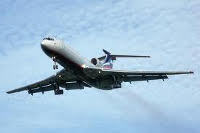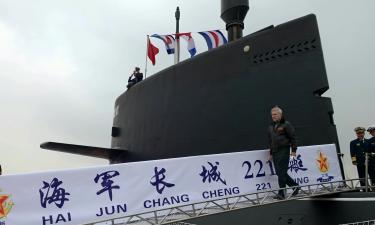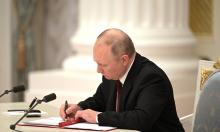Iran bans Russia's Tu-154 planes
 The Iranian authorities are going to introduce a ban on utilizing the Russian aircraft Tupolev starting February, 2011. This decision can be made in connection with the increasing number of incidents involving these aircraft on the territory of the republic. In addition, Iran will no longer employ foreign pilots as the country has sufficient number of its own professionals.
The Iranian authorities are going to introduce a ban on utilizing the Russian aircraft Tupolev starting February, 2011. This decision can be made in connection with the increasing number of incidents involving these aircraft on the territory of the republic. In addition, Iran will no longer employ foreign pilots as the country has sufficient number of its own professionals.
A few days ago Director of Civil Aviation Organization of Iran Reza Nahdzhavani ordered Iranian airlines to stop flights of Tu-154 starting February 20, 2011. According to RBC, the document states that "the use of the Tu-154 is prohibited because of recent aircraft incidents and the expiration of this type of aircraft on February 19, 2011." In addition, the Iranian authorities gave all Russian pilots of civilian aircraft working in the Islamic republic two months to leave the country, reported Russian News Service.
Currently, Iranian airlines Iran Air Tour, Kish Air Eram and Taban airlines have approximately 19 aircraft of this model. Experts believe that Iran made this decision in connection with recent incidents whose causes are much deeper than a simple deterioration of aircraft. According to media reports, on January 24, 2010, Tu-154 made an emergency landing at the airport in Mashhad (Iran), injuring 4 people. On July 15, 2009 a passenger aircraft Tu-154 of Caspian Airlines on route from Tehran to Yerevan crashed in Iran. All 153 passengers and 15 crew members died.
A few days later, on July 24 at 6PM local time at the airport of Mashhad, IL-62 of Iranian airline Aria Airlines travelling from Tehran to Mashhad caught on fire during landing. As a result of the accident 17 people were killed (three of them were citizens of Russia), 30 people were injured. After this accident, starting August 16, 2009 the Iranian authorities banned its airlines to lease or buy used aircraft of Russian origin.
Iran cannot purchase American Boeing aircraft due to the economic sanctions imposed by the U.S. Accordingly, Iran cannot buy and use parts manufactured in the U.S. that a number of other countries use. Russian-made Tu-154 were the solution of the issue. According to the Iranian government, U.S. and European sanctions have played their role in accidents and fatalities, since Tehran is forced to buy outdated planes and spare parts in Russia, said Rosbalt.
This statement makes sense, but it does not solve the problem as such. The ban on the use of the Tu-154 makes Iran face the task of further ensuring that airlines are supplied with the units at least somewhat comparable in terms of price and quality. What can the Iranian authorities replace the Russian aircraft with? Used models of Airbus and Boeing. The lease of short-haul Brazilian aircraft is not ruled out, but such option requires a detailed study in the light of political realities. Tehran also plans to develop and create its own medium-range airliner with a capacity of approximately 150 passengers, but the statements alone are not enough.
Iran will certainly abandon the use of Russian aircraft as lately there have been too many factors not in their favor. Even more so because the authorities can make a number of statements, particularly regarding future purchase of eight Boeing aircraft and six Airbus liners.
According to Lenta.ru, Transport Minister Hamid Behbahani said that buying new planes and spare parts from foreign airlines, Iran proves the ineffectiveness of U.S. sanctions. Apotheosis of Eastern diplomacy is to hide its own problems behind political victory. However, Iran still has something to strive for in this area because in June of 2010 the UN Security Council has imposed extensive financial and military sanctions against Iran. A number of prohibitions and restrictions intended to punish Tehran for failing to dismantle its nuclear program affect the economy of Iran, as well as the military-industrial complex of the country. Nevertheless, the republic is currently not going to abandon the development of uranium enrichment and will left virtually with no air force.
Artem Chernyavsky
Bigness
Subscribe to Pravda.Ru Telegram channel, Facebook, RSS!





